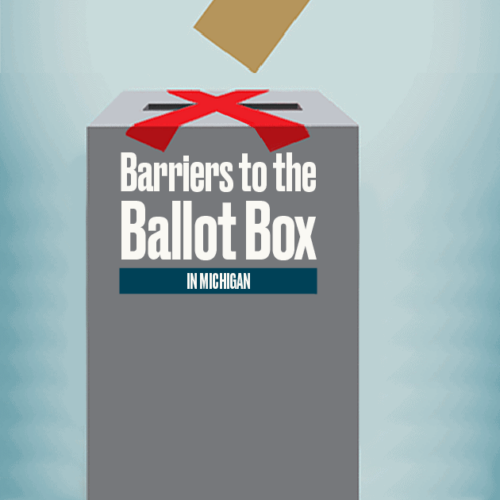Introduction
Thousands of votes, disproportionately cast by Black residents, could be thrown out this November depending on how courts ultimately rule on the deadline for absentee ballots in Michigan.
This is the first major election since the battleground state adopted a sweeping constitutional amendment expanding voting rights. But significant inequalities persist for voters of color.
Sign up for The Moment newsletter
Our CEO Susan Smith Richardson guides you through conversations and context on race and inequality.
One that has the potential to disenfranchise voters this year, according to Sharon Dolente, a voting rights strategist with the ACLU of Michigan, is the reliability of the U.S. Postal Service in the Detroit area compared with predominantly white parts of the state.
“Mail delivery is not identical for every voter in the state,” she said. “It has potential to create real equity issues.”
Dolente and other voting rights advocates want the state to count ballots that are postmarked by Election Day, instead of only those that are received by Election Day. More than 6,000 ballots in the August primary in Michigan were thrown out because they did not arrive before polls closed. A much higher volume for the general election along with a nationwide slowdown in mail delivery could push that number far higher.
Competing lawsuits, emergency rulings, and appeals on this and other voting access issues are still playing out in Michigan ahead of the November election.
Here’s a look at some of the most significant barriers to voting rights and access in the state:
Absentee ballots
A constitutional amendment adopted by voters in 2018 allows any Michigan voter to request an absentee ballot for whatever reason. Previously, they could do so only if they were over 60, had religious objections, or were going to be away from their community on the day of the election. The amendment also allows voter registration as late as Election Day, versus the previous deadline of 30 days prior, and established automatic voter registration for people obtaining driver’s licenses and state ID cards.
These changes, combined with the COVID-19 pandemic and strong interest in this year’s presidential election, have led to a surge in absentee ballot applications. More than 2.7 million have been requested this year, a 145% increase over the total number in 2016, with weeks to go. But that has only increased concerns about whether completed ballots will arrive in the mail in time to be counted.
Voting-rights advocates argued the state’s requirement that ballots be received by Election Day, rather than just postmarked by then, violates Michigan’s new constitutional amendment. A judge ruled in September that the postmark standard should apply instead, and ballots received up to two weeks following the election should be counted. But Republicans are suing in federal court to block that decision.
“It’s the No. 1 threat to voters,” Dolente said of potential mail delays. “It’s the No. 1 risk in the absentee ballot process that voters trip over. It’s a 100-year-old law that I believe is overruled by the constitutional amendment.”
The state is also deploying secure drop boxes for voters who want to return absentee ballots without worrying about potential mail delays. Officials expect 1,000 of them to be in place across the state ahead of the November election, compared with the 700 that were used ahead of the August primary.
Beyond 2020, advocates would like to make absentee balloting more of a seamless process, in which ballots are mailed directly to verified voters, although Dolente acknowledges that it might require another statewide referendum to authorize.
“The current system requires election officials to process two steps and voters to process two steps,” she said. “I spend a ton of time walking voters through those process steps. The next phase for Michigan is to streamline that, and the obvious step would be to move toward more of a vote-by-mail system.”
Republicans are pushing back in the courts at every step. They sued unsuccessfully to block Michigan’s secretary of state from mailing absentee ballot applications to every voter, and they’re suing to block the state’s online absentee ballot application process.
They’re also suing in an attempt to restore a Michigan law, recently overturned by a judge, that prohibited anyone outside of a direct family member to collect and return absentee ballots. Republicans have labeled the practice “ballot harvesting.” Despite virtually no evidence of fraud connected with it, they have used fears about it to push legislation that restricts groups from organizing get-out-the-vote efforts in poor and predominantly Black and Latino communities.
A federal judge also recently struck down a similar (but never really enforced) Michigan law that banned paying drivers to bring voters to the polls.
Information and Infrastructure
Historic and deeply rooted inequality is a significant factor in modern barriers to voting in Michigan.
“We have a long history of cutting revenue sharing here in Michigan,” Dolente said, reducing the amount of money that communities with lower property-tax revenues get from the state. That can mean inadequate public infrastructure in neighborhoods where higher concentrations of people of color reside.
Especially in a pandemic, when more space is necessary for social distancing, that can mean inadequate polling place locations and longer lines on Election Day. There may not be enough staff to get the word out about election changes to clear up confusion that’s been proven to depress voting.
More proactive messaging about the logistics of voting and the rights of voters is needed, Dolente said.
For example, Michigan is fairly progressive when it comes to voting rights for people who have been charged with or convicted of a crime. Anyone can vote unless they are in prison serving a sentence. They can vote before being sentenced, even if they’re being held on bail. And they can vote after their release, even if they’re on parole.
But too few people know that.
“That is a tremendous source of misinformation,” Dolente said. “And given mass incarceration, and given the racial disparities of mass incarceration, that kind of misinformation has very clear impact … on who is part of the electorate.”
Likely due to its status as a battleground state that could flip the outcome of the presidential election in November, Michigan is confronting deliberate misinformation campaigns and dirty tricks in addition to the flurry of Republican lawsuits aimed at limiting voting access.
Two right-wing operatives were charged last week with making automated phone calls to 12,000 Michigan residents, falsely warning them that their personal information could be used to collect debts or execute outstanding criminal warrants if they vote by mail this year.
Read more in Money and Democracy
US Polling Places
Voting is easier in Virginia now, unless you have a felony conviction
Reforms took away photo ID law and excuses for absentee voting.
US Polling Places
In Kentucky, eliminating voting-access restrictions — temporarily
After advocates sued, the governor and secretary of state worked out a pandemic voting plan that offers residents more ways to safely cast a ballot.


Join the conversation
Show Comments